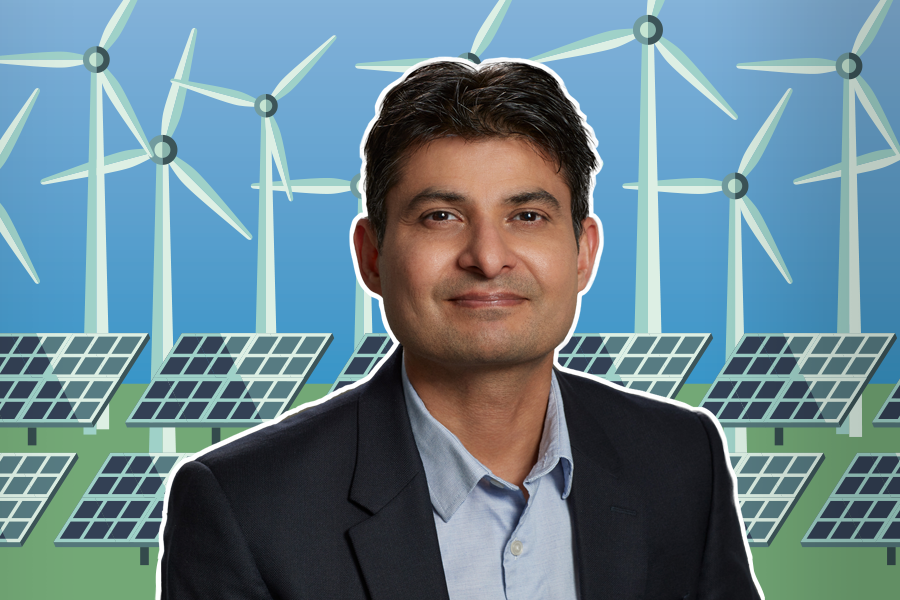
Investing in Clean Energy
CMU alumnus Abhi Sharma lowers Amazon’s carbon footprint
By Elizabeth Speed
When you think of energy use at Amazon, most people picture vans crisscrossing neighborhoods delivering envelopes and boxes emblazoned with the company’s recognizable logo.
But most don’t realize how integral Amazon Web Services (AWS), the world's most comprehensive and broadly adopted cloud, has become in their day-to-day lives. They also don’t realize that increasingly powering the world’s digital infrastructure are hundreds of renewable energy projects enabled by Amazon globally.
To leverage the company’s scale to help accelerate the clean energy transition, Amazon executives wondered, ‘What if all of our energy was clean?’
And the company made a commitment to do just that.
Figuring out the strategy to meet that ambitious goal consumes the energy of Carnegie Mellon University alumnus Abhishek “Abhi” Sharma, lead clean energy strategist at AWS.
“Amazon is one of the largest corporate buyers of clean energy worldwide,” says Abhi, a 2014 graduate of the School of Computer Science with a master’s degree in robotics. “We committed to power our operations with 100% renewable energy by 2030, including Amazon’s corporate offices, Amazon fulfillment centers and AWS data centers that support millions of customers globally.
“But we accelerated that, and we are on a path to reach that goal by 2025.”
"We have announced over 400 clean energy projects that once fully operational will produce enough clean electricity to power over 5.6 million U.S. homes. Only a handful of companies globally have invested more than Amazon has in clean energy to help fight climate change."
Lighting up the future of clean energy
When Abhi joined Amazon in 2014, clean energy sources weren’t easily available in all regions across the globe.
In many markets, Amazon had to foster the development of a clean energy source from the ground up.
Abhi’s job is to work with global energy companies to develop those sustainable sources from solar and wind projects located near AWS operations worldwide.
His mix of energy trading sophistication, technical know-how and ability to reach across business functions helps him bring new technologies online on a large scale.
The complexity of his day-to-day tasks goes well beyond the engineering side of power and focuses on addressing clean energy concerns related to regulation, legal aspects, financing and policy.
Contending with these challenges often requires Abhi to invent new commercial arrangements and work with power developers from small to large multinational utilities in regions like Asia, Europe and Africa to provide clean energy to AWS.
“We have announced over 400 clean energy projects that once fully operational will produce enough clean electricity to power over 5.6 million U.S. homes,” he says. “Only a handful of companies globally have invested more than Amazon has in clean energy to help fight climate change.”
Aging infrastructure, market regulations and ever-changing policies ensure Abhi has plenty of challenges while advancing Amazon’s goal, but it’s worth it.
“We’re doing it for our children,” he says. “One of the most meaningful things about the space I'm in is helping add clean energy to energy grids globally.
“I’m playing a small role, so that our children will have a better environment. I’m helping to fight climate change. It's very humbling to be able to do that at scale.”
“I went to CMU primarily because of the reputation in machine learning, AI and computer science. But looking back almost 20 years later, I think solving real-world problems and working across disciplines were the real CMU value. They’re something that has endured.”
Powering light bulbs wasn’t the original idea
Before joining AWS and relatively fresh out of Carnegie Mellon, Abhi co-founded his first of three artificial intelligence and machine learning companies.
However, the financial crisis of 2008 created a tough market for success. The company didn’t endure, but the opportunities it presented to Abhi certainly did, as it clued him into the energy sector.
“My current journey was born out of a failure,” Abhi says.
At his next two companies, Abhi applied his CMU training in AI and machine learning to energy trading.
The niche attracted his interest because it’s a problem-rich area that was ripe for innovation. Along the way, Abhi had to understand energy trading and finance deeply, which put him in a position to see energy investment from a unique vantage point.
He went on to build an energy trading and service platform, and that led to an electricity trading hedge fund.
This unique mix of skills and experience put him in the perfect spot for his current role at Amazon.
“I’ve been able to use AI and ML tools to solve thorny problems,” he says. “I went to CMU primarily because of the reputation in machine learning, AI and computer science. But looking back almost 20 years later, I think solving real-world problems and working across disciplines were the real CMU value. They’re something that has endured.”